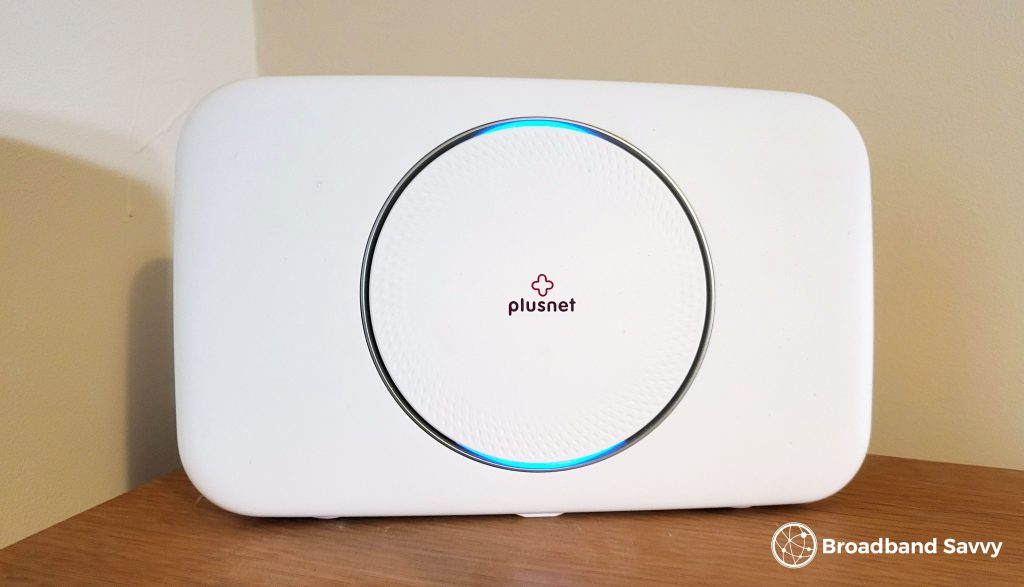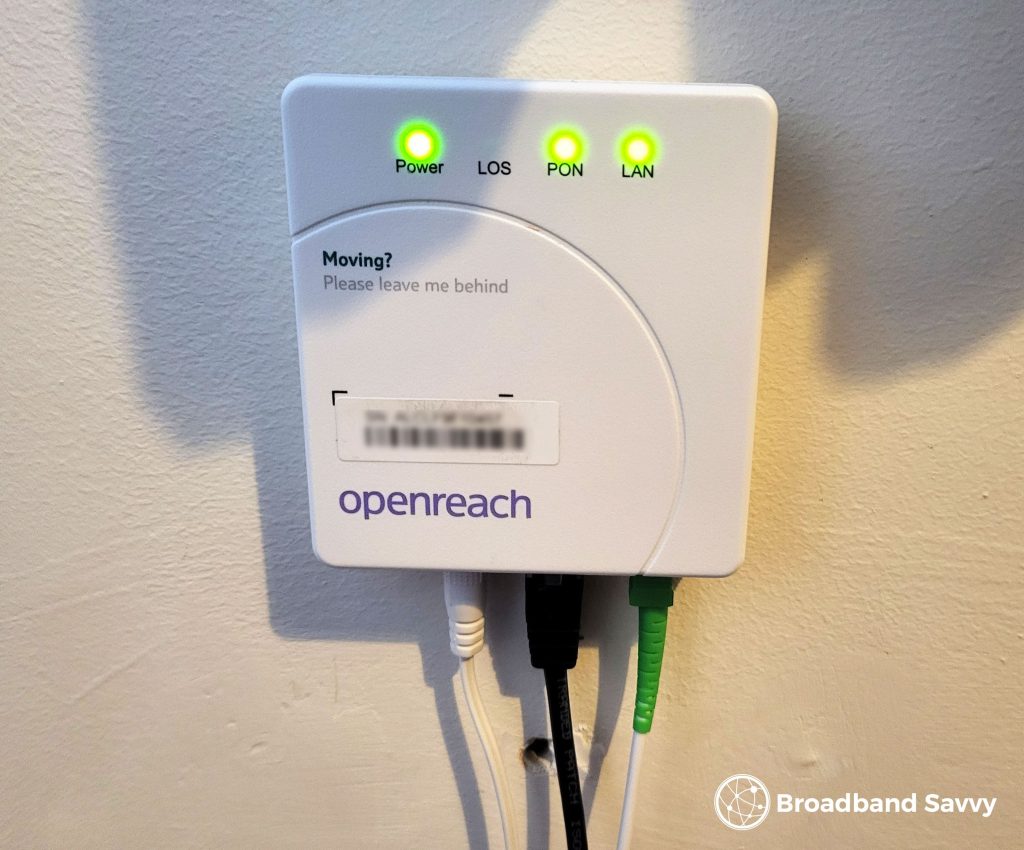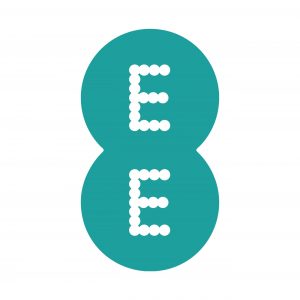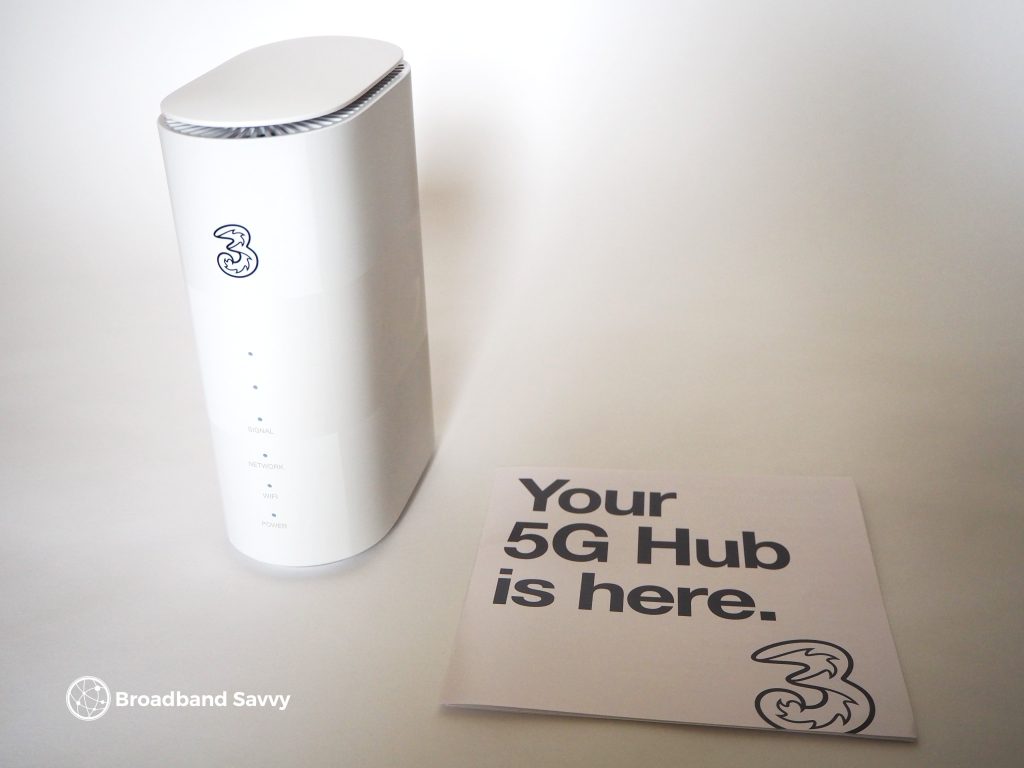Searching for a broadband plan with no upfront fee?
In this buyer’s guide, we’ve reviewed the 5 best broadband deals with no upfront costs on the market in 2026.
Let’s get started.
Best broadband deals with no setup fee
Below, we’ve reviewed and compared 5 of the best broadband packages with no installation costs that you can buy right now.
1. Vodafone Pro 3 Broadband
In terms of the amount of value you get, if you’re looking for broadband with no setup fee, Vodafone Pro 3 Broadband is hard to beat.
You can get download speeds of up to 910 Mbps in full fibre areas with this provider. However, the main thing that sets Pro 3 Broadband apart is all of the extras that are included, such as:
- A 4G broadband backup device, keeping you connected to the internet in case your fibre broadband ever goes offline.
- A WiFi 7 Ultra Hub router, giving you access to better Wi-Fi speeds, and better Wi-Fi coverage if you have a large house.
- A Wi-Fi booster, giving you even better Wi-Fi signal.
You can also choose to add on an Apple TV+ subscription, with a free Apple TV 4K device, for an extra fee, if desired.
And if you don’t want any of these extras, there is a basic plan that is very price-competitive, even compared to other budget broadband providers.
No matter which Vodafone Broadband tariff you choose, there are no upfront costs. The only downside is, you have to commit to a 24 month contract.
Pros
- Comes with heaps of quite useful extras.
- Can get a WiFi 6E router, which not many providers offer.
- Can add on Apple TV.
- Basic plans are reasonably priced.
Cons
- 24 month contract.
2. Plusnet Full Fibre
If you don’t want to commit to a 24 month agreement, or you are looking to save as much money as possible, Plusnet is worth checking out.
We tested their Full Fibre 900 deal and found it to offer very consistent download and upload speeds, at or above the 900 Mbps we were paying for.

Plusnet’s customer service is also very good, in our experience. Since they’re owned by BT, when you call Plusnet you get connected to the same UK-based customer support team, and they’re quick to answer the phone.
The downside to Plusnet is they’re quite basic. They don’t offer much in the way of extras or benefits like Vodafone does. Also, you have to sign up to a 24 month contract.
However, their monthly costs are very reasonable, and there are currently no setup fees on their full fibre broadband deals, with average download speeds ranging from 74 up to 900 Mbps.
Pros
- Low monthly costs.
- Great customer service.
- Consistent speeds, in our experience.
Cons
- Must commit for 24 months.
3. EE Broadband Busiest Bundle
EE offers the fastest widely available broadband in the UK at the moment.
With their Busiest Bundle, you can get a download speed of 1.6 Gbps – that’s 1,600 Mbps, or 78% faster than what most other Openreach providers like BT, Vodafone or Sky offer.
if you don’t quite need this much bandwidth, EE has a range of superfast and ultrafast fibre broadband deals to choose from, many of which have no upfront costs.
EE Broadband isn’t cheap, but they do give you a lot of value in return for the higher monthly cost.
You get free Xbox Game Pass Ultimate access on some of their deals, and they also give you their Smart Hub Plus router, which is WiFi 6 compatible – it’s quite a good bit of kit.
Also, if you’re an EE Mobile customer, you can get a free upgrade to unlimited data, if you join their broadband service.
Apart from the fact that you have to commit for 24 months, the biggest downside to EE is not all of their deals have no setup fee. Some of their ultrafast plans have an upfront cost.
Pros
- Can get extremely fast 1.6 Gbps download speeds.
- Comes with a WiFi 6 router.
- EE Mobile customers are upgraded to unlimited data.
- Includes free Xbox Game Pass.
Cons
- 24 month contract.
- Some plans have an upfront fee.
4. Three 5G Hub
Unlike the other providers we’ve reviewed in this guide, Three home broadband is delivered using the mobile network, rather than fibre.
This means that the connection can be a bit less consistent, and your latency will be higher, so it’s not a great choice for competitive gaming.
However, the Three 5G Hub router offers the cheapest way of getting download speeds of 500+ Mbps in the UK. In fact, we measured speeds of more than 700 Mbps when testing this device.
There are no upfront fees, unlimited data is included, and you have the choice of getting the 5G Hub on a 1 month or a 24 month contract, although the pay as you go option does have an initial cost.
Plus, since this router uses the mobile network, you can pick it up and take it with you on holiday, anywhere in the UK, as long as you get 4G or 5G signal from Three.
Also, Three’s home broadband router is very easy to set up. One of the reasons they don’t charge an upfront fee is no engineer visit is necessary. When the package arrives in the mail, all you need to do is insert the SIM into the router, plug it in, and turn it on.
Note that when you put your postcode in on the Three website, if you can only get 4G signal at your address, they will get you to buy their 4G product instead. This device is very similar, except you can only expect average download speeds of about 40-50 Mbps with it.
Pros
- Great value for money.
- Offers download speeds of more than 500 Mbps in our testing.
- Easy to set up.
- Available on a 1 month or 24 month contract.
Cons
- Less consistent than using fibre broadband.
5. Virgin Media Gig1
Virgin Media doesn’t always have no upfront costs on all of their broadband plans, but they do have a specific section of their website with these types of deals available.
Using Virgin Media, you can get download speeds of up to 1,130 Mbps with their Gig1 broadband plan.
In many parts of the UK, they’re the fastest provider available, only topped by EE’s Busiest Bundle in Openreach full fibre areas that can access this 1.6 Gbps deal.
The big advantage of Virgin Media, apart from their speeds, is their cable TV add-ons. If you want a set-top box and access to the best range of channels, including Sky Sports, it’s hard to go past Virgin.
Also, if you just want a broadband-only deal, their prices are quite reasonable, given the download speeds on offer. Plus, you only have to commit to an 18 month contract, rather than the 24 months that you have to join EE or Plusnet for.
The downside to Virgin Media is their customer service isn’t the best. When we tested their M200 plan, we weren’t quite able to get the full speeds we were paying for. Also, their customer satisfaction ratings are quite low compared to other major providers, according to the latest Ofcom research.
Pros
- Offers fast average download speeds.
- Great range of TV add-ons.
- Reasonable monthly costs.
Cons
- Customer service isn’t the best.
How to choose a no setup fee broadband deal
In this part of the article, we’ve explained some important things to know when shopping for a broadband deal with no setup fees.
Which broadband providers offer deals with no installation fees?
The following broadband providers currently offer deals with no upfront costs:
- Vodafone
- Plusnet
- EE
- Virgin Media (on a different page on their website)
- Three (4G or 5G mobile broadband)
- Direct Save Telecom
- Airband (only available in certain areas)
Also, these providers normally charge a setup fee, but sometimes remove it during special promotions:
- BT
- Sky
- TalkTalk
The good thing about BT is while they do charge a decent setup fee, they also normally include quite a substantial BT Reward Card for new customers as well.
This reward card can be used just like a prepaid debit card, and is normally worth enough to offset the setup cost. Therefore, we think that BT is worth considering, if you don’t mind paying an upfront fee and having it reimbursed later. Click here to see their deals.
Shell Energy Broadband and TalkTalk might not appear to have a setup fee when you visit the deals page on their website, but will add one later in the checkout process, most of the time.
Are there any downsides to buying a broadband plan with no upfront costs?
The good thing about buying a broadband deal with no installation charges is you get to keep your money in the bank for longer.
Broadband setup fees can be quite substantial, sometimes as much as £30-£40. Therefore, there are decent savings to be had by avoiding a deal with an upfront fee.
However, there are some downsides to buying a broadband plan with no setup costs:
- Very few providers offer broadband deals with no upfront fees at the moment. This means that by buying one of these plans, you’ll be significantly restricting the number of providers you can choose from.
- Broadband deals with no setup costs normally require entering into a long term contract, typically 18 or 24 months.
- Sometimes, broadband plans with no installation costs will be more expensive in the long run. If you buy a tariff with a setup fee, the average monthly cost over the life of the contract might be lower.
On the plus side though, there aren’t really any catches to broadband packages with no upfront fees, if you can find a package that meets your needs.
For example, you’ll still get the same Wi-Fi router sent to you for free, even if you buy ultrafast fibre broadband and need a state-of-the-art WiFi 6 compatible router.
Will I have to pay for an engineer to set up my connection?
Normally, when you buy a new broadband plan, it’s not immediately made clear whether or not an engineer visit is needed to get you online.
Therefore, if you’re looking to avoid upfront fees, you might be wondering if you’ll need to pay an engineer call-out fee at a later date.
Fortunately, it’s not normal for broadband providers to charge extra for technician visits. You don’t need to worry about having to pay an extra installation charge, if the tariff is advertised as having no upfront costs.
However, Virgin Media does sometimes charge a call-out fee in certain situations. They may do this if self-installation of certain equipment is possible, but you choose to have a technician come over to perform the work instead.
How to save money when buying broadband
Apart from avoiding upfront costs, here are some other ways you can save money when switching broadband providers.
- Only pay for the download and upload speeds you really need, given how many people live at home, and how you use the internet. You can use our calculator to get an idea of the average speed it’s worth paying for.
- Look for a basic broadband provider that doesn’t offer any extra add-ons like TV bundles, or reward cards.
- Use Three mobile broadband to get online. Their 4G and 5G broadband service is a lot cheaper than using fibre, in most cases.
- Make sure to compare all deals on the market, including those with a setup cost, to see which plans are cheapest. But don’t use a comparison website, because they will promote deals from providers that pay them the most money. Read our broadband deals guide to get an idea of the best providers on the market at the moment, and the differences between them.
- Consider joining the same provider you’re using for your mobile phone service. If you have a pay monthly phone contract with a company that also offers home broadband service, like Vodafone, you might be able to get a discounted broadband deal.
- Avoid short-term broadband contracts if you can, as they tend to have a higher monthly cost. We’ve discussed contracts in more detail later in the article.
Can you get ultrafast fibre broadband with no upfront fees?
Many providers offer ultrafast broadband deals that don’t come with an upfront fee.
You can get download speeds of up to 910 Mbps in some areas with Vodafone, and up to 1.6 Gbps with EE, without paying an activation fee. Community Fibre and Plusnet also offer full fibre broadband with no installation cost.
Can I avoid locking into a long-term contract?
All of the broadband providers we’ve mentioned on this page have a minimum 18 or 24 month contract on their deals with no setup cost.
This is quite typical – if you’re not paying an upfront fee, most of the time, the broadband provider will want to keep you as a customer for longer, to ensure that they make some profit.
If you want a 12 month or a 30-day contract, we recommend checking out Hyperoptic, although they will normally charge an upfront fee, and are mostly only available in city centers.
Will I need to pass a credit check?
You will likely need to pass a credit check to buy a broadband deal on a contract, no matter whether an activation cost is involved or not on the tariff you’ve chosen.
If you have bad credit, we recommend using Plusnet Broadband, as they are one of the only British broadband providers that doesn’t require new customers pass pass a credit check before joining.
It also might be worth trying TalkTalk Broadband if you’re worried about failing a credit check. They can be a bit more lenient when it comes to approving new customers’ credit checks, compared to other providers, although they often charge an upfront fee.
Do “free broadband” offers still exist?

Some broadband providers used to offer deals where you would get “free” broadband bundled with another service, like cable TV, or your home phone.
These broadband deals would have no upfront fee and no monthly cost, although there would be a monthly fee associated with the bundled service that the broadband was sold with.
Eventually, the Advertising Standards Authority (ASA) banned this practice, because it was found to be confusing.
However, in recent years, broadband providers have begun offering a different type of free broadband deal.
When promotions are running, it is not uncommon to see broadband providers offer a free broadband connection for the first 3-6 months, especially on a 24 month contract. We have seen BT, as well as other providers, do this in the recent past.
Once the free broadband period expires, you will begin paying the regular monthly cost for your broadband and line rental service.
Conclusion
This is the end of our buyer’s guide.
If you want to save as much money as possible, while still getting good customer support, we think Plusnet is a great choice. Based on our testing, they offer similar consistency and Wi-Fi coverage to many of the bigger broadband providers, but for a cheaper price.
If you’re not sure which broadband provider to choose, leave us a comment below, and we’ll get back to you.
About the author

Tyler is the co-founder of Broadband Savvy. He has been helping people improve their broadband connectivity since 2018 by writing about fibre broadband and mobile broadband providers, as well as creating tutorials to help people improve their broadband speeds and Wi-Fi signal.
Tyler is responsible for the majority of buyer’s guides and broadband reviews published on Broadband Savvy. He has a wealth of experience testing and reviewing different broadband tariffs, including fibre internet plans, as well as 4G and 5G broadband deals. He is responsible for testing and evaluating Wi-Fi routers, performing speed and latency tests, and comparing the value for money of different broadband providers on the market in the UK.
Before co-founding Broadband Savvy, Tyler had a long history of tinkering with computers. He built his first PC at the age of 12, and since then, he’s become obsessed with all things networking and internet-related. He’s a massive gamer, loves Rocket League, and also plays Sunday League football.















